How the hell did NATSU-MON 20th Century Summer Kid cure my irony poisoning?
Give it to me straight doc, how cringe am I?
(BPM+ Side Quest): I penned this essay as an explanation of my absence, a love letter to Kaz Ayabe’s video games, and reminder to refute the urge to let the world strip you of your compassion.
Nostalgia is a poison—an intoxicant so strong that when you experience it in the right circumstances, you have no choice but to shelter yourself within its grasp and submit. I tend to engage with nostalgia the way one does with roadside billboards for hamburgers, acknowledging their grandness but diverting your attention back to life’s vehicle, keeping your eyes toward the horizon and waving its attempts to satisfy some comfortable desire that exists only in the rear-view mirror of your mind.
One “cool” thing about getting older is that ignoring nostalgia becomes a daily insurmountable task. Every ad, celebrity, product, or company wants to market something that asks you to “remember a time when things weren’t so tough?” From pizza to pills, corporations have informed me that just remembering the good old days might be enough to cure my weighing existential crisis or an overwhelming sense of dread. However, ignoring that those aforementioned issues were brought on by last year’s pills and pizzas that were filled with microplastics. So the question is, will this product with 90’s retro Chucky-Cheese font make me forget about the bad times? Short answer, no. Long answer, nah, my boy.
Another “cool” thing you often do as you age is convincing yourself that nothing is “cool” anymore if you’ve engaged with it before. Remakes. Remasters. Reimagines, all are trash because you were there for ground-break. You laid your eyes upon the golden age, so why would you waste your time engaging with anything that looks similar to something you thought was original. This results in you beginning to mentally dig yourself into a hole.
Step 1: Encountering Toxic Substances.
For a moment, you scan the space before you, and you recognize nothing. You've tunneled too deep in your attempt at evading the tender yet smothering arms of nostalgia. How deep? It is so deep that your keen techniques for pointing out aimless attempts at attention-grabbing nostalgia are gone. Now, you can only approximate where you stand in this darkness, but something is clear to you, there is a different type of intoxicant down here. Unbeknownst to you, your attempts at refuge have struck a metaphorical pipeline, and that intoxicant has begun seeping into the burrow. Sadly, you've engineered the perfect environment for irony poisoning to permeate, and now you're suffocating.
Step 2: Recognize the Symptoms of Poisoning.
Recently, I recognized I was suffocating, after hours of dissociating in my home office. As a self-titled digital curator of gaming culture, not engaging with the medium was killing me. Still, I couldn’t persuade my psyche to cooperate. Friends suggested I needed a vacation, but in this economy, that wasn’t going to happen. My family explained I needed time off, but if I couldn’t engage with anything besides the blank wall of my office, I’d feel cheated of using PTO. My wife, who only engages with video games at a distance and is the inspiration for the Substack, curiously asked,
“Whatever happened to that game you were playing last summer?”
Which one?
“The one where you’re a little Japanese boy? you go to an island or something?”
Oh yeah, Boku no Natsuyasumi 2: Umi no Bouken-hen
“Yeah, sure.”
Why do you ask?
“It was cute, and I thought it was funny when I asked you what you did in it, and you said.. nothing.. just relax and be a kid.”
Yeah, they got a new one out I should play it, but it’s probably just the same as the last one.
“And? what’s wrong with that?”
Filled to the gills with irony poisoning, I opened my mouth expecting some dismissive soliloquy to fall out, but I didn’t have an answer. Maybe a little vacation from my office wall could do the trick. The next day, I copped a copy of NATSU-MON 20th Century Summer Kid, plus the associated DLC. I told myself I’d approach it with as open of a mind as possible. NATSU-MON follows a simple story set up similarly to other Natsuyasumi games. You control a young boy, this time named Satoru, whose only job is to adjust to his new surroundings for 31 days of his August summer break. In past iterations of the series, the same summer break would occur in the 1970s or the 1980s, but NATSU-MON’S setting lands right in 1999, mirroring the years of my own memories of summer break.
As the game opens, you’re greeted by the title screen parading about with a whimsical flute theme made for what I’d expect to be in an advertisement for “build-a-bear.” However, the theme alone felt like the refreshing carbonated mist flung from the pop-top of a cold canned beverage on the first 100-degree day of vacation. A smirk of joy crept across my jaded smile, and it was only the beginning.
Step 3: Plan Accordingly.
Off the top, I adjusted the game’s passage of time settings to “easy.” This modification would give me time to settle into the world without rushing and turning my time here into a pursuit of objectives. This was Satoru’s and my vacation, and the number one rule of summer vacation is that there are no rules. The story began with the lil homie staring out the window of an industrial 18-wheeler. The truck carried a colorful shipping container with the symbol of a circus tent painted on the side. The game’s world set before me in all its vibrancy, and in response, irony poising fumed from my eyes as it manifested into physical form, carrying my eyes in an expertly maneuvered eye-roll. The toxicity jolted from my lips, saying, “Seriously, ya parents run a circus? You serious bro. Y’all trying so hard to not be another Natsuyasumi game that y’all start with this bullshit. I’m supposed to be hanging out, not running a damn clown show.”
To my surprise, Satoru felt the same; he had brought a similar hesitation to this new beachside town. Feeling the exhaustive nature of being blood-related to a traveling circus, the lil homie felt the need to reassure himself and, by proxy, me that it would only be 31 days, and somehow that eased my commitment issues. At that moment, I told myself I could commit to 31 in-game days. Best case scenario, I'd have some new Steam achievements for my profile, worse case, I’d take up another extended stay staring at my home office wall.
Step 4: Discuss Treatment Options.
During the first few days spent in the world, the game impressively lays out its time mechanics for getting situated and how you’ll spend your next month. As Satoru, you wake up each morning and have breakfast with some circus troupe members, the guest house owner, and her niece. Afterward, you, as the player, are free to wander the world.
So I began to model my personal vacation mantras in-game. I spent the first few days walking the island and taking in the sites. In the morning, I’d head to the beach and collect crabs for fishing bait; in the afternoon, I’d swim out to the isolated rock formations that I pretended were little secret islands that only I, as a ten-year-old boy, were strong enough to reach, there I would catch fish for our guest-house owner to prepare as unique little side dishes for our evening meals. Near sunset, I’d spend hours scouring hills, searching for buzzing cicadas that hid within the knot holes of towering oak trees that scraped the clouds. In the evening, I was called back home to dine with my circus troupe family, where I recounted my thrilling adventures.
Whereas in reality, I couldn't shake the sentimentality that Satoru's world stirred within me. This contemplation seemed to summon nostalgia’s phantom grip, which comforted and troubled me. The irony toxin fueling this avoidance led me to struggle against appreciating the game's unique, but confusing gift that it held in front of me. I kept telling myself, "I'm only here because the game is slow and lets me explore at my own pace, but once this stops being leisure, I'm logging out.
Step 5: Administer Care.
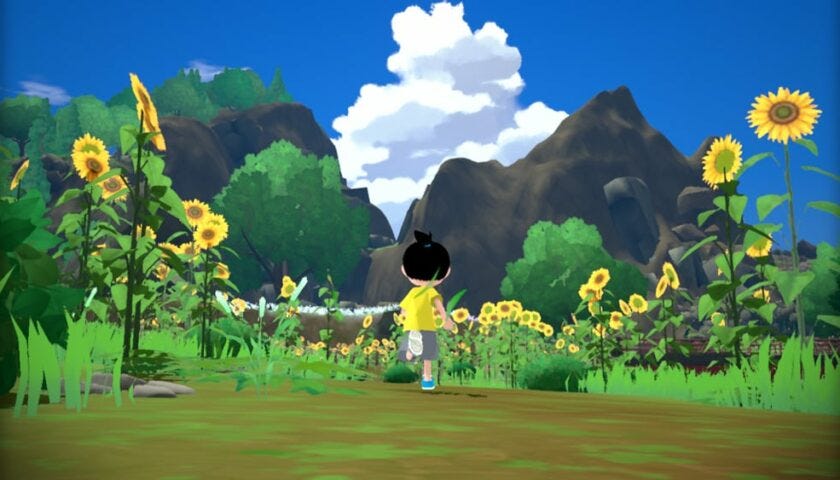
Around my fifth day in game, one of the performers mentioned over breakfast that the circus was slipping into a financial crisis. By the 15th of August, a sum of 30,000 Yen would be needed to keep things stable. Just like before, the poison recessed from my mouth, but this time with diluted intensity. “That’s a lot of cash! How y’all running this circus into the ground. Look, if I run up against that amount of money, I might be able to help,” is what I said out loud, but my actions led to me stacking more Yen than the GDP of this sleepy seaside town. Something inside me had started to break. I knew the local convenience store would trade you pocket change for recycling bottles found at the beach, the local museum was in the market of accepting fossils and specialty wildlife for cash, and the youthful reporter who I’d run into on one of my nightly walks to catch fireflies had mentioned he’d pay me for crayon illustrations of the local fauna so I had some prospects.
Curiously, I paused the game and asked myself why I wanted to do this? Why did I genuinely want to help these characters? I had only engaged with the game for seven real-world days. I didn’t want to help because it would advance the story or even get a Steam achievement. I wanted to help because, in some way, these characters were helping me. All my actions during this virtual vacation were effortless to me, but somehow, the game was surgically excising my irony poisoning and replacing it with an appreciation attributing to the simplicity of life. This whimsical-ass little game had presented me with the privilege to let myself feel anything other than animosity, and I was too blind to comprehend its offering; in the moment. On the surface I accepted the task, because it’d give me an excuse to explore more of NATSU-MON’s world, but underneath, I could feel something was breaking.
Step 6: Question Your Own Introspection.
By August 15th, Satoru and I saved up more than 30,000 Yen. In actuality, we had 254,489 Yen, so you know, little money for the circus, little money to ball out on toys I had been eyeing since the first week of our summer break. Another upsetting news exchange came after delivering that cash to the troupe without any additional questions. For some back story, Satoru’s parents leave him with the circus troupe as his guardians after the first day in town. The only problem is the circus’ show schedule had begun, and Satoru’s father, who is the troupe’s ringleader, still hadn’t made his way home yet.
With no leadership and audiences inquiring about whether the show will go on, Satoru and the player are asked to carry the proverbial torch and become the troupe’s manager. Now if you were paying attention earlier, I was very clear about “not running a damn clown show.” The introduction of this game play mechanic didn’t sit well with the poisoning. The game once again leapt to my cynicism, reassuring me that it'd be okay if I didn’t want to help out. The troupe would survive. They had their money now; besides, I made that money by doing things I wanted. I wanted to go fishing for specialty sea creatures so the museum could have lovely displays for other school children. I wanted to clean up those bottles so people could enjoy the town the way I did. I wanted to hunt for fauna around town so the reporter could have new articles for the citizens to witness their nature's beauty. But Why? What was wrong with me? Why did I do any of this? And WHY DID I CARE?
Step 7: Allow Yourself to Heal.

When I started NATSU-MON, my only goal was to try to play a game that would be bright enough to lighten my mood of despair. I had become overwhelmed with handling the march of time and consumerism’s lust for trying to bottle those transient moments at salary payment prices. Their willingness to sell me and others of my generation the memories of childhood and what we meant to each other before things needed to be remade, remastered, and argued over. Consequently, spending time back in the era of my childhood via the eyes of Satoru, a kid who began cynically about his summer break only to fall into altruism through my own actions, felt like putting a mirror up to my egotistical armor and asking, “What’s the point of shrouding yourself in bitterness, It isn’t helping others, and it isn’t helping you,”
In this final moment of self-reflection, I couldn't ignore my feelings any longer. I had to embrace the truth. My time engaging with this game was not just about completing objectives, experiencing a simulated vacation, or escaping my pessimism. By accepting these requests to help the characters, I was rediscovering the profound impact we have on each other's lives. What started as mild symptoms had transformed into a contamination that had weighed me down for months infiltrating my household, work, and psyche. However, if I was willing to give myself the grace to feel tenderness here in this virtual space, then maybe I was breaking out of my irony poisoned slump in reality and returning to the beauty of human compassion.
So, I ran that damn clown show. After occupying my days lazing around, I’d return each night to moonlight as the youngest circus ringleader in Japan. I dropped cash on new circus props, new costumes, orchestrated new acts, and increased audience attendance from our nightly dinner guests to the whole town filling every seat, and as the audience grew so did the confidence of every member of the troupe. Unfortunately, despite our best efforts we had yet to complete a perfect show. Our headlining trapeze act couldn’t seem to close the distance, resulting in one of the two perpetually plunging into the safety net below, rather than their hand’s meeting in an secure embrace. Nevertheless, I had faith and continued to include them in the performance each night. I reminded myself that if this game had given me the time and space to acknowledge my feelings and rebuild my compassion, I could extend that same support by allowing these performers to step up, even when the obstacles felt overwhelming.
Time marched on, and I found myself in the last week of August. As night fell, I approached the tent and began the show. As the lights sparked to life, I cheered on every performance with earnest enthusiasm, praying in anticipation, for their hands to meet, and achieve the perfect show. But, if it didn't happen, I would start mentally planning the couple’s next attempt. Immediately upon considering the thought, the two clasped hands mid-air, finishing with a fanfare from the audience and a real-world exclamation from me. Witnessing these two fictional characters I’d help succeed dealt a deathblow strike to my irony-poisoned mental veneer, resulting in the intoxicant oozing out of my mind and finding itself in a metaphorical pool on my desk. What began with NATSU-MON’S title screen theme making me smirk had ended with a cut scene entirely shattering my mental arrogance that I had fortressed in chain-linked shrouds of irony.
Step 8: Expel All Substances That Are Toxic.
NATSU-MON: 20th Century Summer Kid; graciously reminded me of the profound strength that video games have. They offer us a unique window into the experiences of others and invite us to reflect on our own lives. More importantly, they create a safe haven for healing, self-acceptance, and limitless adventures, allowing us to embrace those emotions without fear of judgment, when we allow them into our hearts and minds.
I come to you as I reach the end of this “Side Quest” empathically restored. I’ll be honest: I’ve never been the most candid person, and I don't expect to immediately transform completely after playing NATSU-MON. I understand that healing in all forms takes time. That said, the experience I had here has given me a healthier method for interacting with the world and myself. It was a journey, and I’m eternally grateful to have accepted the opportunity to grow from it.
Thank you for letting me share my heart with you. I’ll see you next time, somewhere in this digital ether. Drink more water. Love yourself a bit more. And actually play the games you buy.
Dedicated to my wife, our dog, our kitten, and my office wall.







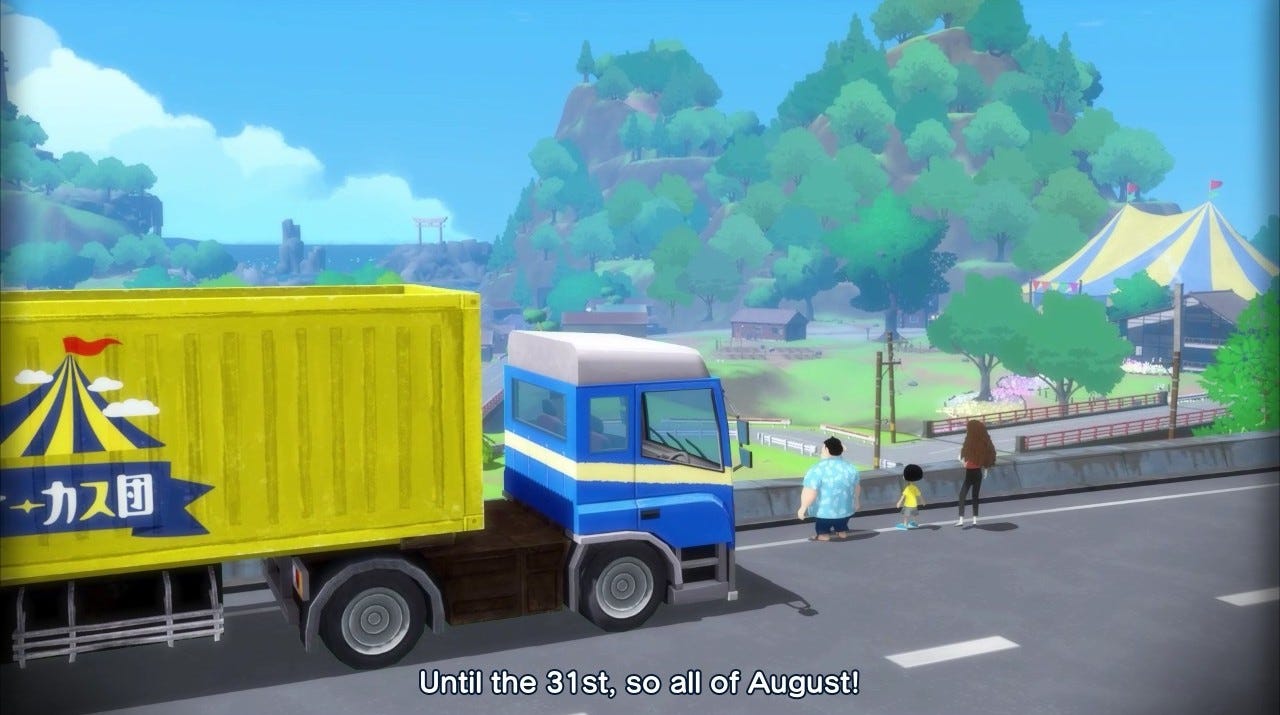
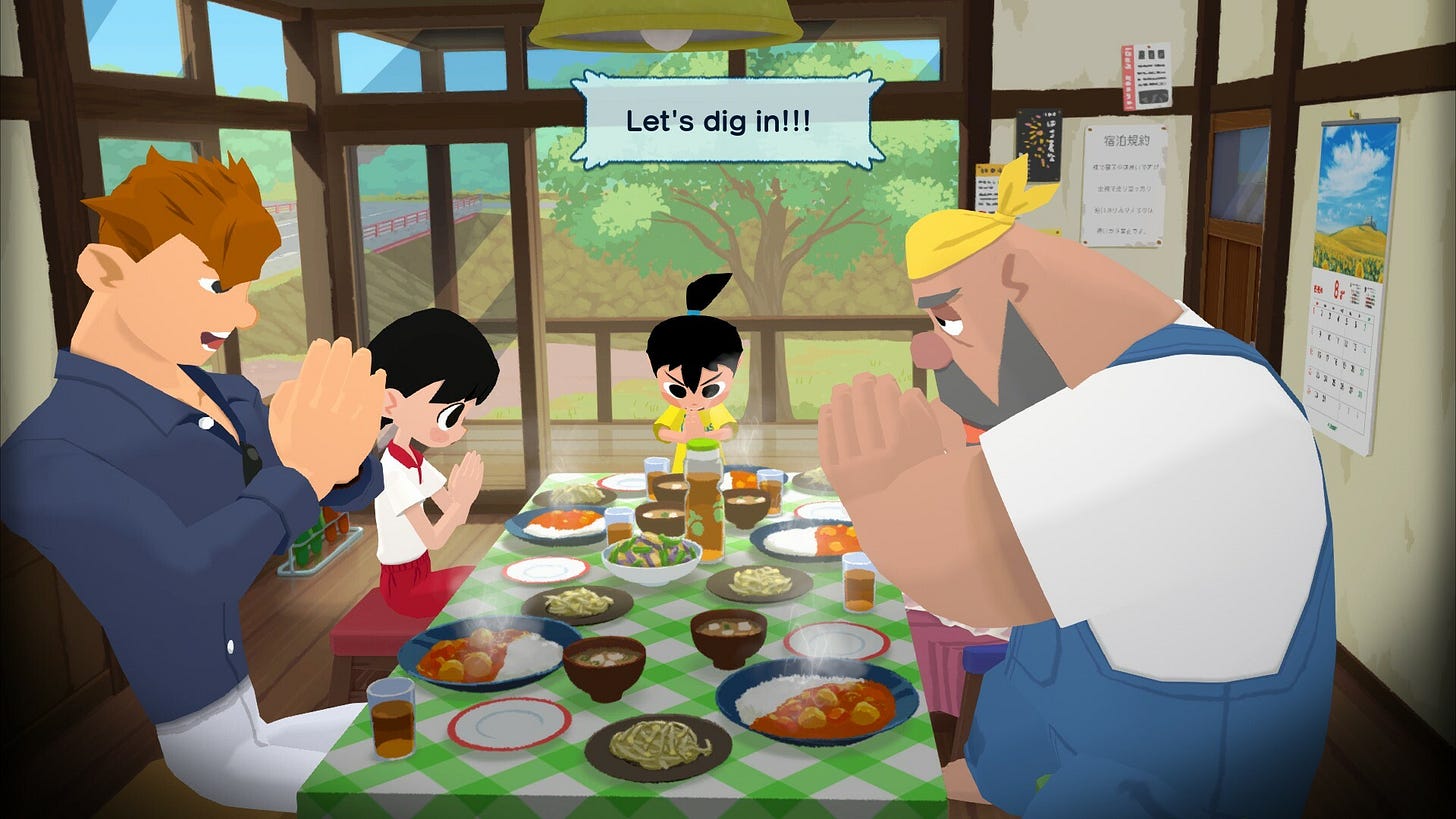


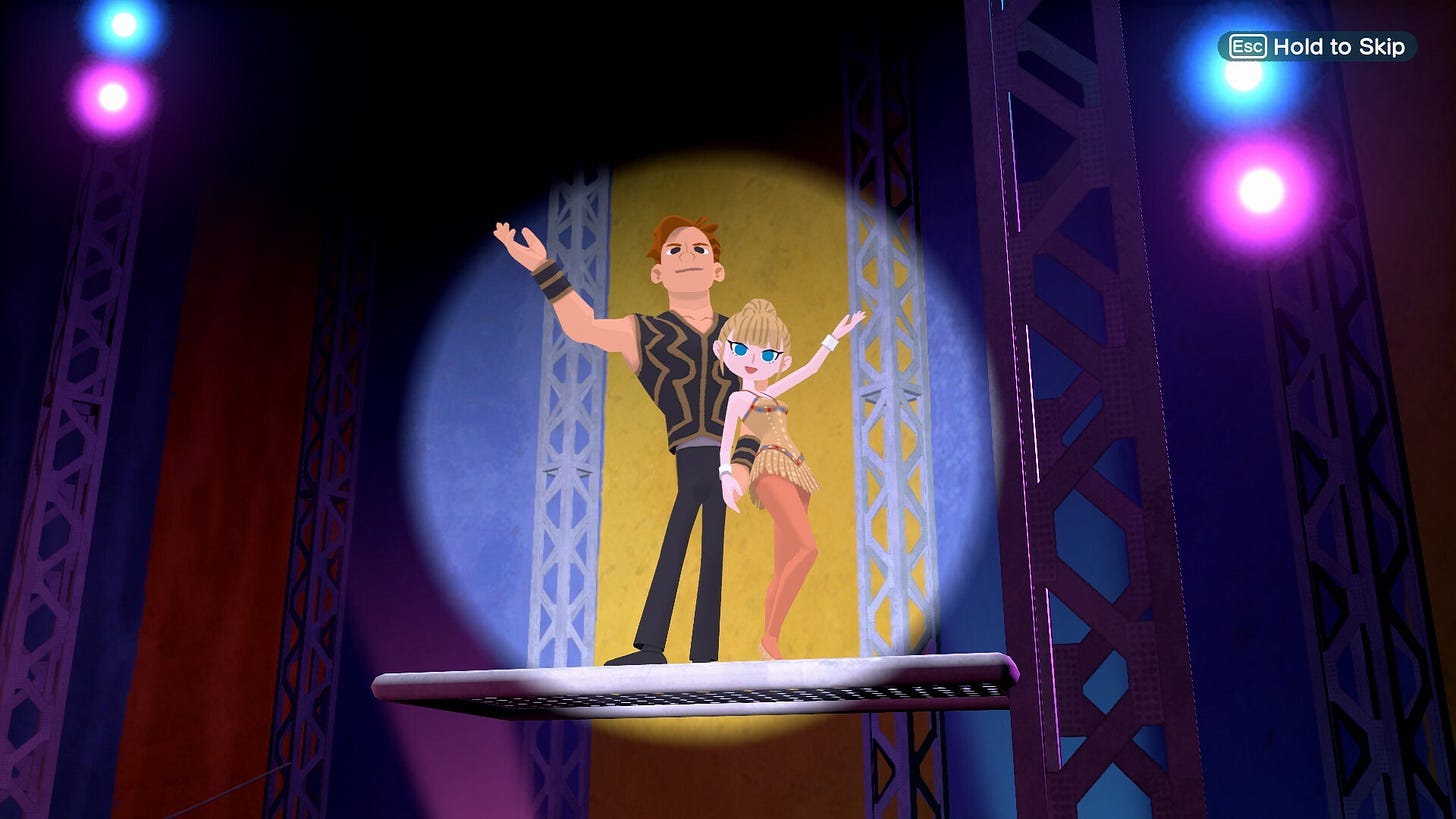
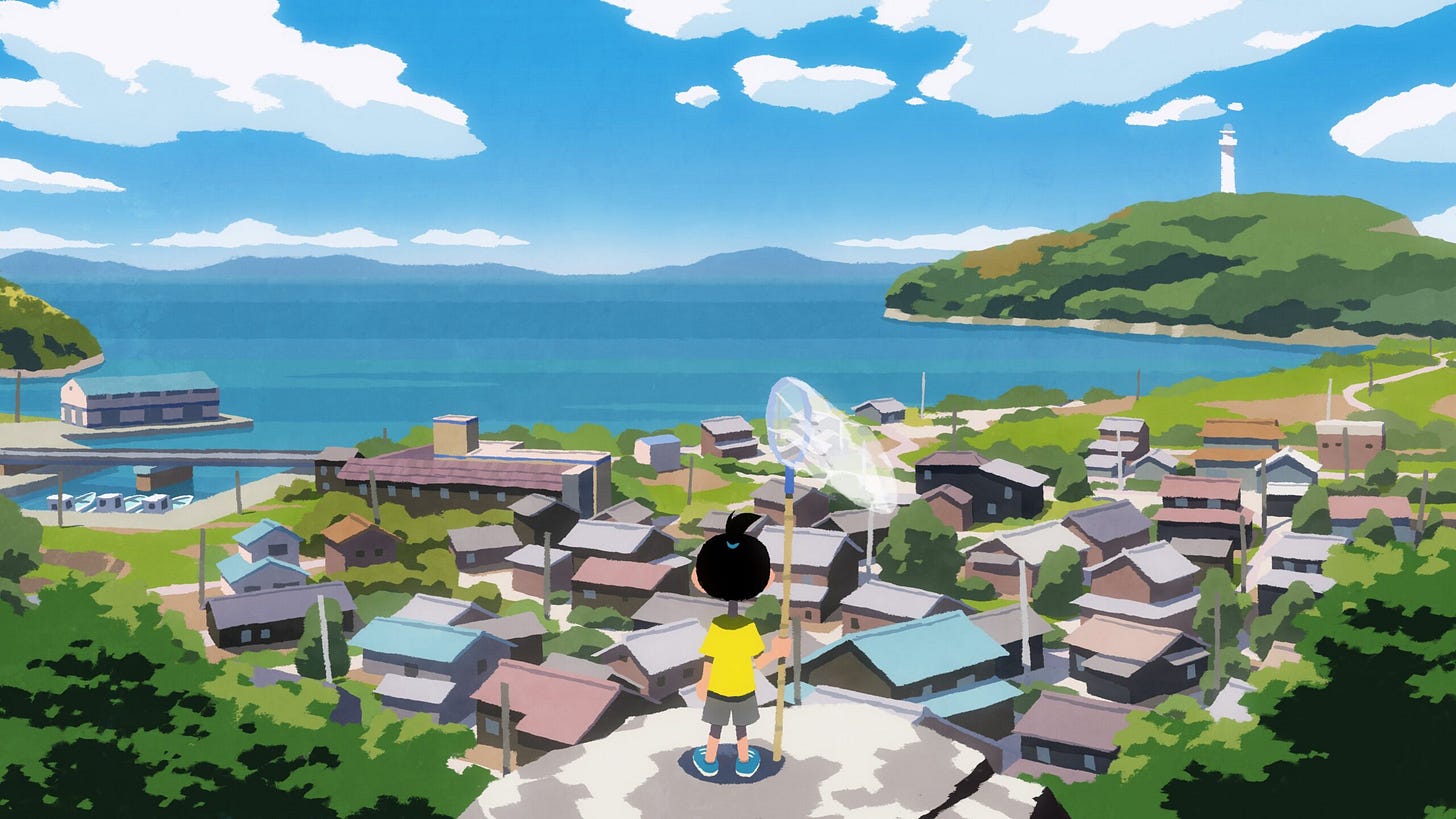
There was no cringe detected. However I am not a medical professional so you may still want to get it checked...
More seriously, this was a great read on the positive power gaming can have. Well done.
What a beautifully written piece. Very enjoyable to read.